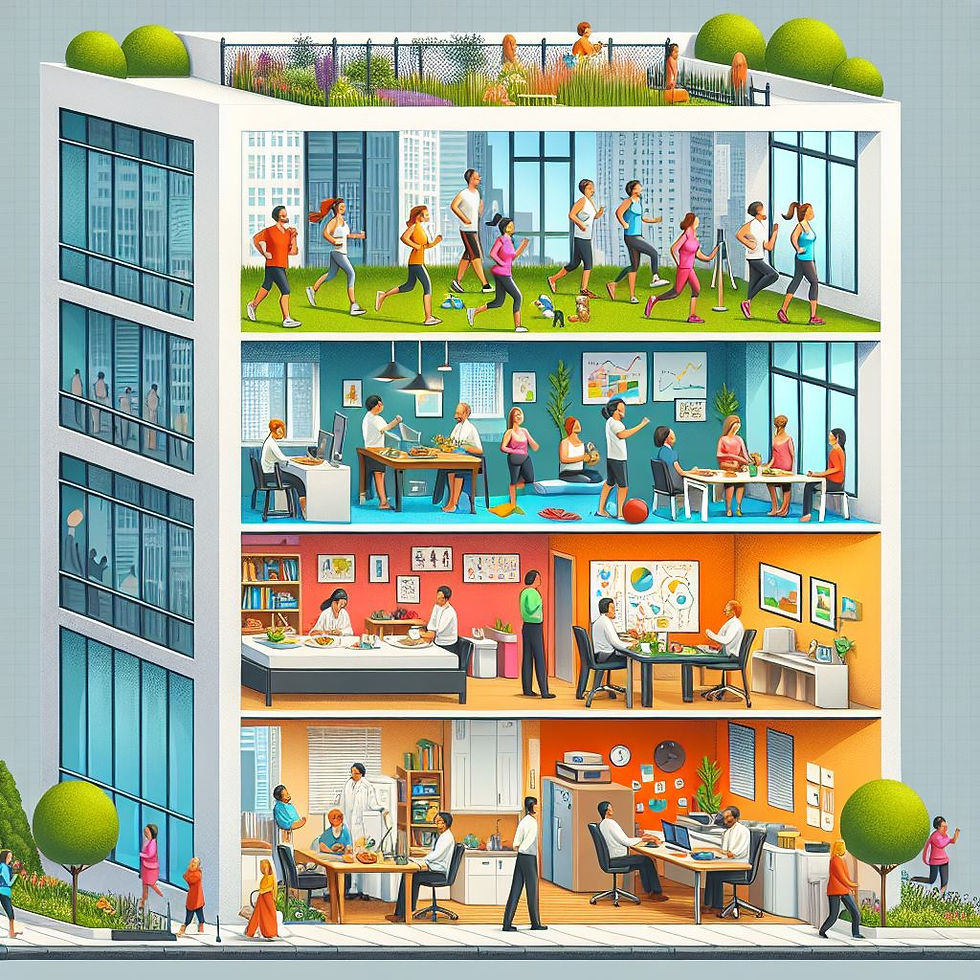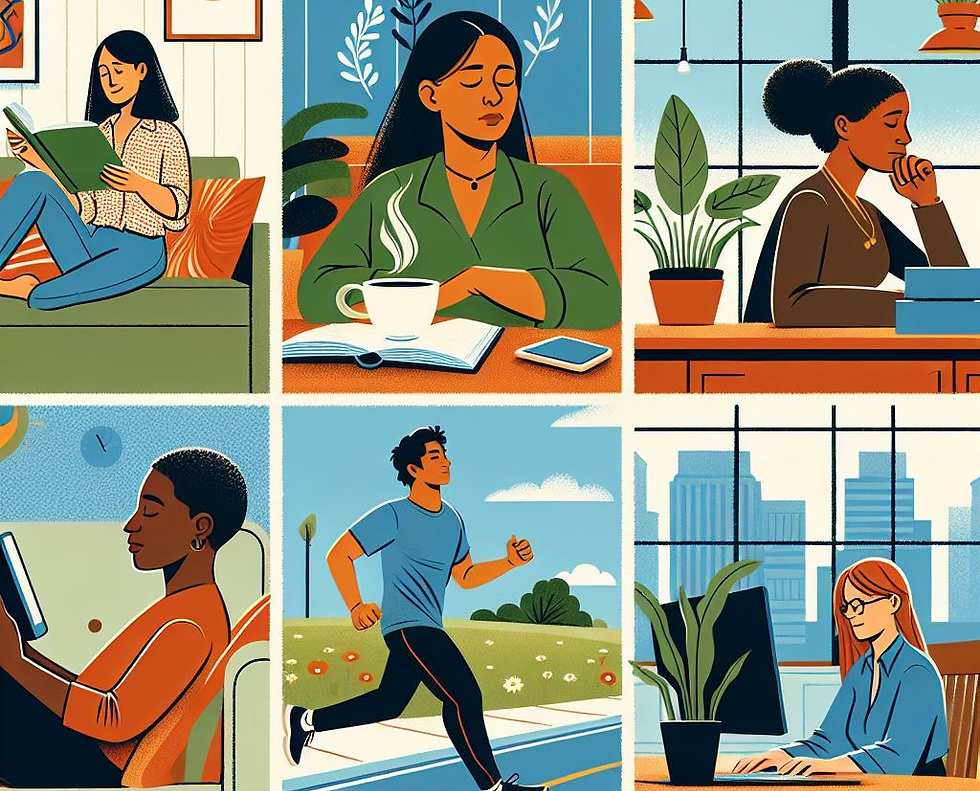PL³ Series: Cultivating Wellness in All Aspects of Life
- Nick (AI assisted)

- Dec 21, 2024
- 4 min read
Bringing Balance and Joy Across Private, Professional, and Public Roles
Welcome to the final installment of the PL³ series! Over the past few blogs, we’ve explored goal-setting, time management, living authentically, and setting expectations to protect your well-being. Now, we’re tying it all together by examining how to cultivate wellness across all aspects of life—private, professional, and public.

Achieving true wellness requires effort and intentionality. It’s about harmonizing the different aspects of your life while acknowledging that challenges will arise. To illustrate these lessons, let’s look at the stories of Viola Davis and Daymond John, and reflect on how empathy and care for others can transform pain into healing.
Overcoming Adversity with Resilience
Viola Davis grew up in extreme poverty, often going to bed hungry and wearing second-hand clothes. Despite these hardships, she rose to become one of Hollywood’s most acclaimed actresses. However, even after achieving professional success, Viola struggled with feelings of inadequacy and the weight of societal expectations.
In her memoir, Finding Me, Viola shares how therapy, spirituality, and self-acceptance helped her heal. She emphasizes that success isn’t about external accolades but finding inner peace and fulfillment.
Key Lesson: Wellness begins with confronting your pain, setting parameters for what you will and won’t accept, and focusing on the values that bring you peace. Viola’s story shows that cultivating wellness requires resilience and a commitment to personal growth.
Turning Challenges into Triumphs
Daymond John, the entrepreneur and star of Shark Tank, is known for founding the iconic FUBU clothing brand. However, his journey was far from easy. Daymond faced dyslexia, financial hardships, and countless rejections while building his business. These challenges could have derailed him, but instead, he used them as fuel to push forward.
In his book, Rise and Grind, Daymond explains how setting clear priorities and maintaining a disciplined routine helped him stay focused. He also emphasizes the importance of balancing hustle with self-care, noting that burnout can destroy even the most promising ventures.
Key Lesson: Wellness isn’t just about working hard—it’s about working smart. Daymond’s story highlights the importance of setting expectations, prioritizing self-care, and turning obstacles into opportunities for growth.
“Hurting People Hurt People”
One of the most profound truths in life is that pain, when left unaddressed, often manifests outwardly. The phrase "hurting people hurt people" reminds us that much of the conflict we encounter stems from unresolved struggles within ourselves or others.
This truth is the foundation of why aBLe4U2 exists and why I’ve dedicated the last seven years to building this program. My own struggles, the challenges faced by loved ones, and the stories of past students prove the immense need for a program like aBLe4U2. It is a response to the cycles of pain that can persist across generations, workplaces, and communities.
Wellness is not just about caring for yourself; it’s about caring for others, too. Programs like aBLe4U2 are designed to provide tools and support for people to break out of these cycles and live healthier, more connected lives. Here’s how empathy and care can make a difference:
In Professional Life: Recognizing a coworker’s stress and offering help can change their day and build better workplace dynamics.
In Public Life: Supporting causes that reduce systemic pain, such as food banks or mental health initiatives, can uplift entire communities.
In Private Life: Open conversations about pain and forgiveness within families can heal deep wounds and create stronger relationships.
When we prioritize empathy, we not only heal ourselves but also help others find their path to wellness.
Cultivating Wellness in Your Life
What do these stories and truths teach us? That wellness is a mosaic of intentional decisions made across every aspect of life. Here’s how you can cultivate it:
Private Life: Make time for self-reflection and personal joy. Whether it’s journaling, exercising, or spending time with loved ones, nurture the relationships and activities that sustain you.
Professional Life: Advocate for meaningful work, set realistic expectations, and learn to say no when demands exceed your capacity.
Public Life: Participate in causes and activities that align with your values while staying grounded in who you are.
Accountability and Empathy
Each of us is accountable for the decisions we make. Whether it’s setting expectations, managing our time, or aligning with our core values, our wellness is ultimately in our hands. But we are also responsible for fostering wellness in others.
Caring for others, even in small ways, can create ripples of healing. When we treat each other with kindness and empathy, we acknowledge that everyone carries unseen burdens. Recognizing this can break cycles of pain and foster a culture of mutual support.
This belief is at the heart of aBLe4U2. Through this program, we not only empower individuals to make better decisions for themselves but also equip them to help others. Together, we can reduce pain and build a brighter, healthier future. As we conclude the PL³ series, consider the choices you’ve made so far and the ones still ahead. How can you integrate wellness into all aspects of your life? And how can you help others do the same?
Next time, we’ll begin exploring insights from The 7 Habits of Highly Effective People, a guide to aligning habits with purpose and achieving lasting personal and professional success. Stay tuned—because a brighter, balanced life is aBLe 4U2!




Comments